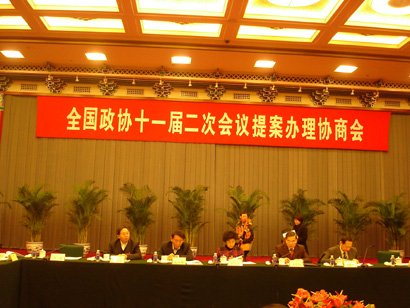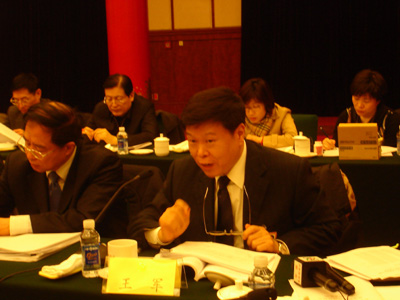
| Advisers Buckle down to Fixing Growing Pains As overseas markets wane, thousands of export-driven factories along China's coastline have fallen victim to the global downturn, driving legions of migrant workers back to their hometowns in the countryside. At the ongoing session of the Chinese People's Political Consultative Conference, advisers get down to the most pressing problem on the table. There is a broad consensus among them that the situation is grim and that measures should be taken as soon as possible to avoid further damage. According to data from the Ministry of Agriculture, about 20 million of the estimated total of 130 million migrant workers – considered to be the cornerstone of China's once sizzling economy – have been forced to return to rural areas after the job market began to dry up in the fourth quarter of 2008.
 At the same time China is moving up the manufacturing sector ladder, from churning out cheap goods that require unskilled or low-skilled workers to more advanced and value-added products, adding to the severity of the problem and the size of the challenge facing the government. "For some migrant workers who have no job in the city and who are denied the last resort of returning to the land after leasing or transferring their land-use rights to others, the situation is worse," said Li Bin, a member from southwest China's Guangxi. "The government should offer them the immediate help they need before they become a source of social unrest." The government has adopted a series of favorable policies to help the returnees start their own business in their hometown, including increased subsidies, greater access to loans, job-training programs, and more funds for rural development projects. According to Wang Jun, a vice minister of finance, the ministry will allocate 42 billion yuan in subsidies to support employment this year. But some members are warning that the government must put these policies in place rather than simply paying lip service to the problem.
Huang Zhixian, a member of the CPPCC, said that farmers generally have limited social networks and few channels to start their own business. At the current conference, he proposed to step up an information network in the countryside, allowing them to have access to useful information.Yang Wenlong, a member from Jiangxi Province who has conducted a survey in Jiangxi and Hunan provinces, noticed that many returning farmers are unwilling to turn back to agricultural work. "On the one hand, they don't make much money on farming, and on the other hand, they have grown accustomed to the comforts of city life." But the picture is not all doom and gloom. According to data from the Ministry of Human Resources and Social Security and the National Bureau of Statistics, 80 percent of about 5 million migrant workers who returned to the countryside to spend lunar New Year holiday had returned to jobs in the cities by late February. In 2008, China posted a growth rate of 9 percent, which although the lowest in seven years, was still a bright spot in an otherwise dismal international economic climate saturated with struggling economies. (Source: china.org.cn) |
||
| [Home] |
Tel: 86-10-68326037
Fax: 86-010-68328338
Website: http://www.chinatoday.com.cn
E-mail: chinatoday@chinatoday.com.cn
Copyright (C) China Today, All Rights Reserved.
